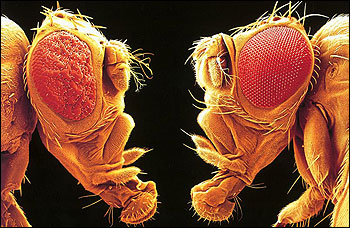A new study has profound implications for understanding free will, reports Roger Highfield Even
tiny fruit flies may have something akin to free will, according to a
remarkable study that adds a new twist to a problem that has perpelexed
philosophers for millennia. | |  | | Researchers tethered fruit flies in completely uniform white surroundings and recorded their moves |
Some of the greatest thinkers, such as Thomas Hobbes and David Hume
have wrestled with the issue of free will, which has a range of
scientific, religious, legal and ethical implications and is central to
what it means to be human. Now evidence of
spontaneity - a measure of self determination or free will - has been
found in Drosophila, the tiny buzzing specks which, over the years,
have become one of the favourite experimental subjects of geneticists
around the planet. It had been thought that they
simply behave like tiny chemical machines, being attracted by the smell
of rotting fruit, and evading being swatted, without giving what they
are doing a single thought. But that underplays
the subtlety of the fly mind, according to a study published in the the
journal PLoS ONE in which an international team argues that the term
'will' would not apply if our actions were completely random, nor would
it be 'free' if they were entirely determined.
So if there is free will, it must be somewhere between chance and
necessity - which is exactly where fly behaviour comes to be, according
to Björn Brembs from the Free University Berlin.
"Animals and especially insects are usually seen as complex robots
which only respond to external stimuli," says Brembs. When scientists
observe the flies deviating from the expected response, "they attribute
this variability to random errors in a complex brain."
By combining an automatic way to measure fly behaviour, and then using
sophisticated mathematical analyses, the international team of
researchers showed for the first time that such variability cannot be
due to simple truly random events but is generated non-randomly by the
brain, so there is an underlying pattern of spontaneity. "We show free
will "can" exist, but we do not "prove" it does," said Brembs.
Chaos theory is analogous to what they found, he said, where simple so
called "deterministic" equations can produce apparently random
behaviour, showing that there is an underlying mathematical logic to
the supposed mayhem. And the find refutes claims "that in principle we
can built a "Mr. Puppet" whose behaviour we can predict to "95%"" he
said. This also means that a murderer is indeed
responsible for his actions and not a puppet driven by his
neurochemistry. "If humans brains possessed a similar spontaneity
trait, every situation would provide them with several behavioural
options. In this sense, a murderer can usually be made responsible for
his crimes because he only rarely would be left without alternative."
"The point here is that the people claiming that free will doesn't
exist say that one day we will be able to show exactly why a murderer must
necessarily have acted the way he did by looking closely at his brain.
We can show that you cannot even do this in fly brains, as a matter of
principle." These results caught computer
scientist and lead author Alexander Maye from the University of Hamburg
by surprise: "I would have never guessed that simple flies who
otherwise keep bouncing off the same window have the capacity for
nonrandom spontaneity if given the chance." For
their experiments, the researchers tethered fruit flies in completely
uniform white surroundings and recorded their moves. Given that every
direction looks the same to the fly, the team expected them to randomly
buzz about. However, the analysis showed that fly behaviour was very
different from random noise. Only after the team
analyzed the buzzing flies with methods developed by co-authors George
Sugihara and Chih-hao Hsieh from the Scripps Institution of
Oceanography in San Diego did they realize the origin of the fly's
peculiar spontaneity. "The results of our analysis indicate a mechanism
which might be common to many other animals and could form the
biological foundation for what we experience as free will" said
Sugihara. The reason that fruit flies have this
trait is to make them more unpredictable to help them to survive and
thrive. "The literature is full of examples of how advantageous
unpredictable behaviour is, only one of them being unpredictable escape
maneuvers when a prey is chased by a predator," says Brembs.
The team now plans to use genetics to pinpoint and understand the brain
circuits responsible for spontaneity. This step could lead directly to
the development of robots with the capacity to make their own choices
and may given insights into disorders such as depression, schizophrenia
or obsessive compulsive disorder, which affects the ability to be
spontaneous. Michelle Thew, chief executive of the
British Union for the Abolition of Vivisection, said: "Animals across
the spectrum are increasingly being shown to be more intelligent than
previously assumed. We would expect to see a corresponding shift in the
way they are treated by both science and society as more knowledge
emerges." |